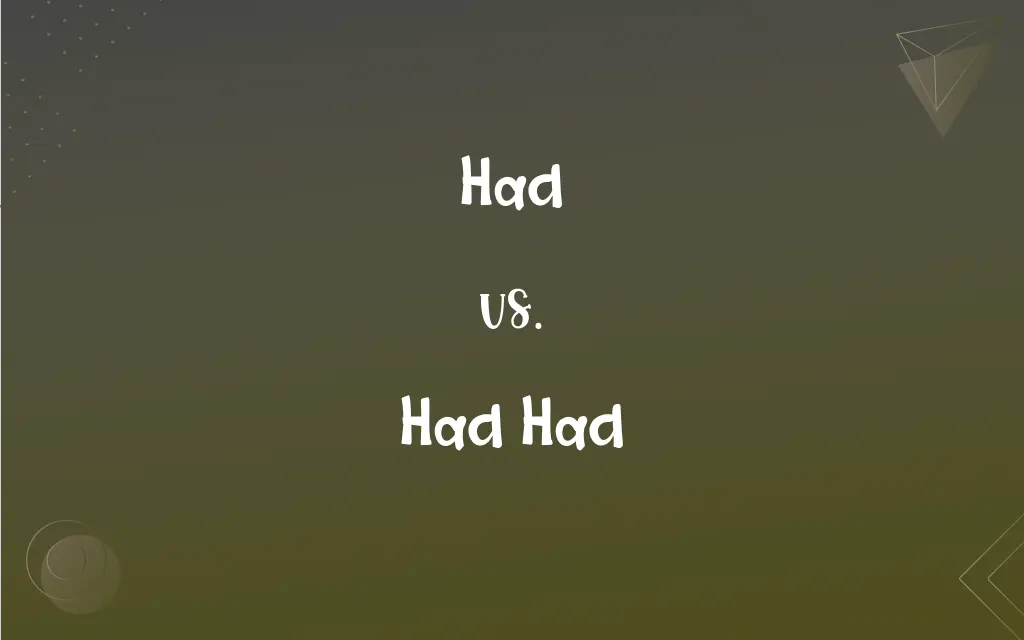Had vs. Had Had: What's the Difference?
Edited by Aimie Carlson || By Janet White || Published on February 29, 2024
"Had" is the past tense of "have," used to indicate possession or completion of action. "Had had" is the past perfect tense, used to describe an action that occurred before another action in the past.

Key Differences
"Had" is used as a simple past tense verb to denote possession or completion of an action. "Had had," as the past perfect form, emphasizes an action that was completed before another past action or time.
In grammar, "had" functions as a main verb or auxiliary verb in past tense sentences. "Had had" combines an auxiliary verb with a main verb in past perfect tense, indicating a further past action.
"Had" is commonly used in sentences referring to past events or states. "Had had" is used in more complex sentences to clarify the sequence of past events.
In literature, "had" is frequently used for past narration. "Had had" appears in complex narrative structures, showing a deeper past or a contrast in times.
"Had" alone can sometimes be ambiguous about specific timeframes. "Had had" provides clarity, specifically indicating that one action occurred before another in the past.
ADVERTISEMENT
Comparison Chart
Grammatical Tense
Simple Past
Past Perfect
Usage
Indicates past possession or action
Indicates an action before another past action
Sentence Complexity
Used in simple past tense sentences
Used in complex sentences for clarity
Timeframe Indication
General past reference
Specific sequence of past events
Example in Narration
Direct past narration
Narration of events before another timeframe
ADVERTISEMENT
Had and Had Had Definitions
Had
Past tense of "have" indicating possession.
She had a beautiful garden.
Had Had
Used in conditional sentences to refer to hypothetical past situations.
If I had had more time, I would have visited.
Had
Used to indicate a past action or state.
He had finished his work early.
Had Had
Emphasizing the completion of an action before another past moment.
They had had their meeting before the announcement.
Had
To hold or maintain something in the past.
They had the key to the old house.
Had Had
Expressing repetition or duration before a point in the past.
He had had the same job for ten years.
Had
Past completion of an action.
I had seen that movie before.
Had Had
Past perfect form of "have," indicating an action completed before another past action.
I had had lunch before they arrived.
Had
To experience or undergo something in the past.
We had a great time at the party.
Had Had
To possess or experience something prior to another past event.
She had had enough rest before the journey.
Had
Past tense and past participle of have.
Had
Simple past tense and past participle of have|cap=1.
This morning I had an egg for breakfast.
A good time was had by all.
FAQs
What is the basic function of "had"?
"Had" is used as the past tense of "have" for possession or completion of an action.
How is "had had" different in use?
"Had had" is the past perfect tense, used to describe an action completed before another past action.
Is "had had" always grammatically correct?
"Had had" is correct in contexts where past perfect tense is appropriate.
Why use "had had" instead of just "had"?
"Had had" clarifies that an action happened before another action in the past.
Does "had" indicate a specific time?
"Had" refers to a general past time but doesn't specify when relative to other events.
Can "had" imply a lost opportunity?
Yes, e.g., "I had the chance but didn't take it."
Can "had" stand alone in a sentence?
Yes, "had" can be the main verb in a sentence.
How does "had had" work in conditional sentences?
"Had had" is used in hypothetical past conditions, e.g., "If I had had more time..."
What is an example of "had" in past perfect tense?
"By the time they arrived, I had finished cooking."
In what situations is "had had" useful?
"Had had" is useful in complex sentences clarifying the sequence of past events.
Is "had" used in conditional sentences?
Yes, often in the form "If I had..."
Can "had had" be used in past perfect continuous tense?
No, "had had" is only past perfect, not continuous.
Do "had" and "had had" have the same pronunciation?
Yes, they are pronounced the same but used differently.
Is "had" often used in storytelling?
Yes, "had" is common in narrating past events.
Can "had" be used in past subjunctive mood?
Yes, particularly in hypotheticals or wishes.
Can "had" be used in questions?
Yes, e.g., "Had you seen the movie?"
How does context affect the use of "had had"?
The context must require indicating a sequence of past events.
What is a common mistake with "had had"?
Using it when a simple past tense "had" is sufficient.
How does "had had" emphasize a past action's completion?
It shows an action was completely finished before another past moment.
Does "had had" appear in everyday conversation?
Less frequently, but it's used for clarity in specific past contexts.
About Author
Written by
Janet WhiteJanet White has been an esteemed writer and blogger for Difference Wiki. Holding a Master's degree in Science and Medical Journalism from the prestigious Boston University, she has consistently demonstrated her expertise and passion for her field. When she's not immersed in her work, Janet relishes her time exercising, delving into a good book, and cherishing moments with friends and family.
Edited by
Aimie CarlsonAimie Carlson, holding a master's degree in English literature, is a fervent English language enthusiast. She lends her writing talents to Difference Wiki, a prominent website that specializes in comparisons, offering readers insightful analyses that both captivate and inform.































































